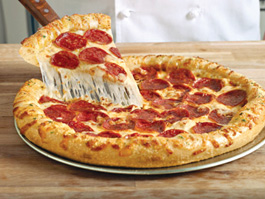home | north bay bohemian index | sonoma, napa, marin county restaurants | review

Dream Dining
By Stett Holbrook
Did you see the new Domino's Pizza commercial in which the company admits that its pizza tastes like garbage and it's trying to do better? Now the company says it is taking bold steps, like using real cheese, sauce that doesn't taste like ketchup and a crust better than the box it comes in. Radical stuff. It's a novel bit of PR that must have been fueled by same really poor sales.
"The old days of trying to spin things simply doesn't work anymore," Domino's president Patrick Doyle told the Associated Press in an interview.
Translation: We've been lying to you for years that our pizza was fit to eat, and now we're going to make pizza without the cheapest low-grade ingredients we can find. We hope you suckers will buy it.
With a wealth of excellent pizza out there, there's no reason to try the "new" Domino's, but I appreciate the company's candor. Imagine if other fast-food companies were equally forthcoming. Imagine further if they not only fessed up to inferior-tasting food but also to the environmental damage and animal suffering they cause. Here are a few scenes taken from my wildest dreams.
"Let's face the facts," says a chief McDonald's officer in a catchy new ad. "The production and transportation of beef are major sources of climate-warming carbon emissions. The grain fed to the cattle destined for our Big Macs and Quarter Pounders could eliminate starvation around the world. We all live on this planet. Happy meals? Who are we kidding?"
The Colonel chimes in: "You'd think that for a company that prides itself on its chicken that we would require our suppliers to treat their birds more humanely," says a contrite Colonel Sanders in a somber new ad campaign. "Sadly, that's not the case. The 750 million chickens raised for KFC are crowded into ammonia- and feces-choked warehouses where they must suffer beak cuttings and broken bones because they are bred to gain so much weight so quickly their bones just snap. I won't even get into how many of these growers go about slaughtering the chickens. Chickens of America, I apologize."
And the king of burgers? After being hounded by PETA and its "Murder Burger" campaign, Burger King agreed to a series of animal-welfare improvements. The company now requires 2 percent of its eggs to come from hens that are not confined to battery cages and now buys 10 percent of its pork from farms that don't use cruel gestation crates where pregnant pigs are immobilized. The company also rewards suppliers that use more humane methods for slaughtering chickens.
"We want to be doing things long before they become a concern for consumers," said Steven Grover, Burger King's vice president for food safety, quality assurance and regulatory compliance. So far did Burger King go that PETA gave the company its "most improved national food chain" award in 2008.
Actually, I didn't dream up that bit about Burger King. It really happened. And the fact is if more of us started to look at the real costs of cheap food and made our decisions accordingly—as Burger King's Grover acknowledged, our "concerns" actually do matter—my dream scenarios for fast-food chains and other restaurants might not be so far off.
Send a letter to the editor about this story.
|
|
|
|
|
|